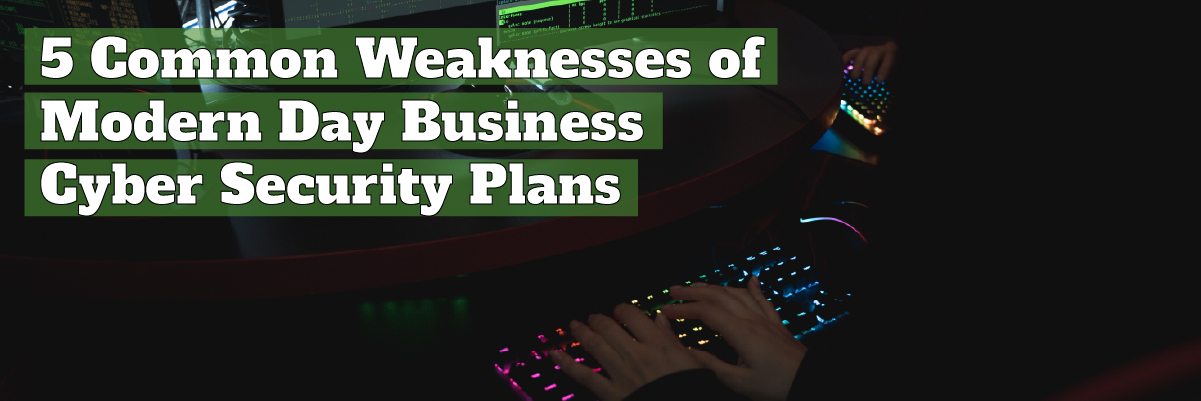5 Common Weaknesses of Modern-Day Business Cyber Security Plans
 A host of advanced and evolving cybersecurity threats have put organizations at risk. All it takes is a system vulnerability or a single weakness to compromise the integrity of an organization. Business owners and security experts are commonly unaware of the vulnerabilities in their IT infrastructure.
A host of advanced and evolving cybersecurity threats have put organizations at risk. All it takes is a system vulnerability or a single weakness to compromise the integrity of an organization. Business owners and security experts are commonly unaware of the vulnerabilities in their IT infrastructure.
If you want to protect your business from cyber threats, it’s essential to recognize the weaknesses in your security environment and take action as soon as possible. Many security experts and small business owners are unaware of cybersecurity. However, you can’t protect your business from cybercriminals if you do not know the vulnerabilities in your IT infrastructure.
Here are some common cybersecurity weaknesses of modern-day business cybersecurity plans.
1. Failure to cover cybersecurity basics
The most common weaknesses and vulnerabilities used by hackers in the past reveal that many organizations fail to cover cybersecurity core values. Organizations often fail to find their vulnerabilities to attack, their valuable and critical assets, and the sophistication of potential cyber criminals. Technology is not the only reason behind security risks. A company’s culture and basic strategic plans also play a significant role in preventing cyber attacks.
2. Lack of a cybersecurity policy
Cybersecurity procedures and guidelines explain how employees, partners, consultants, and end-users access internet resources and online applications. Generally, these policies define the security expectations, responsibilities, and roles in the organization. If you do not make cybersecurity policies in the first place and your employees do not engage with them, then your company may face cyber risks and threats.
Your small business cybersecurity policy should
- identify cybersecurity risks
- protect organization information and network
- establish cybersecurity governance
- detect unauthorized activities
- detect and handle risks associated with third parties

3. Confusing compliance with cybersecurity
Another reason that can put organizations at risk is that they confuse compliance with cybersecurity policies. Ensuring compliance with the organization’s rules is not like protecting it against cyber-attacks unless those rules focus on cybersecurity. A company’s risk management requires that every person in the organization play their role in keeping the security level related to them.
Maintaining security is a company-wide role and responsibility. After seeing the increasing number of cyberattacks, many organizations are still not sufficiently prepared for cybersecurity. Only a few organizations have a cyber incident response plan to protect themselves from cybercriminals.
4. Use of unsecured resources and outdated systems
If you use an unsecured network in your organization, it’s trivially easy for cybercriminals to access your system. Once they infiltrate the network, they can easily access all systems and devices connected to that network. Although it’s the most straightforward step towards a secure environment, many business owners still neglect it. Similarly, using unsecured communication channels can put your organization at risk.
Moreover, using an outdated system can potentially harm your IT infrastructure. Most hardware manufacturers and software developers keep detecting the security threats that can hurt their users. When they see a problem, they try to eliminate it by updating hardware or software. If your organization uses systems without editing them regularly, your business could be at risk.
5. Untrained employees
Almost 90% of data breaches occur due to human error. A slight mistake from an employee could provide an opportunity for cybercriminals to access your business data. Therefore, untrained employees are the most significant vulnerabilities in your organization. It’s necessary to educate your employees and provide them with security training to prevent data breaches caused by human error. By teaching them to use unique and strong passwords, identify different types of attacks, and use secure networks, you can significantly reduce the risk of data breaches in your organization.
Why Small Business Cyber Security is Important
Small businesses may not be as large or have as many resources as larger corporations, but they are still at risk of cyber attacks. Cybersecurity plans are important for small businesses because:
- Protects sensitive information: Small businesses often handle sensitive customer and financial data that must be protected.
- Prevents financial losses: Cyber attacks can result in financial losses for small businesses, including costs for recovery and lost productivity.
- Maintains customer trust: Small businesses depend on customer trust, which can be damaged by a data breach.
- Comply with regulations: Small businesses may be required to comply with privacy regulations such as GDPR and HIPAA.
- Competitive advantage: A strong cybersecurity posture can give small businesses a competitive advantage.
- Supports business continuity: A cybersecurity plan helps small businesses prepare for and recover from cyber incidents, minimizing downtime.
In short, small businesses are vulnerable to cyber threats just like larger organizations, and having a comprehensive cybersecurity plan in place is essential for protecting against these threats and ensuring the business’s long-term success.
Conclusion
Protecting your business in the digital world can be very difficult. Unfortunately, facing security risks is the price we pay for staying connected to the online world. If you are aware of the weaknesses in your security infrastructure, you can keep yourself protected from cybercriminals, or you have the potential to fight against them. Therefore, talk to your employees to ensure they understand the importance of cybersecurity and help them by providing guidance and tools to detect vulnerabilities.
You can take steps to protect yourself against cyberattacks, and you should have a plan before disaster strikes. Talk to Protected Harbor today for cybersecurity small business, so we can help you secure your internet infrastructure. With the right tools in place, such as a dedicated expert tech team available 24×7, remote monitoring, 99.99% uptime, and many more, you have the potential to detect any issues that may arise. The earlier you catch problems, the easier it will be to fix them before they hurt your business’ reputation or harm your bottom line. Contact us today!






